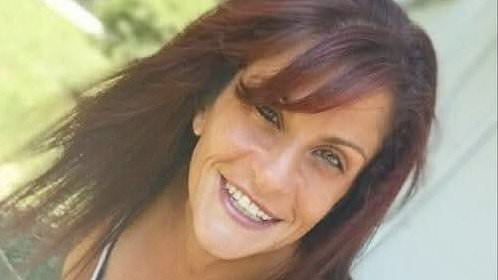Share this @internewscast.com
A woman who momentarily ‘died’ twice has detailed the haunting scenes she claims she saw in heaven.
Lisa Small, from Belleview, Florida, was just 24 when in 2008, she suddenly collapsed and had to be resuscitated.
The now 41-year-old was suffering a drug and alcohol addiction that saw her spend at least $150 a day on the substances when during one cocaine binge she said she stopped breathing but her eyes remained open.
Her then-boyfriend was forced to perform CPR for around 40 seconds, before she regained consciousness.
It was only after she collapsed a second time later that night and stopped breathing again that she sought medical attention.
Here, she said doctors explained that she had gone into respiratory arrest — a serious medical emergency where breathing stops, but the heart continues to beat.
Research suggests just one in six patients survive the medical emergency after five years.
Yet, Ms Small, who works as a waitress, claimed to have miraculously avoided any long-term damage, and said she was one of the handful of people to have survived a near-death experience, ‘like a phoenix out of the ashes’.

Lisa Small, from Belleview, Florida , was just 24 when in 2008, she suddenly collapsed and had to be resuscitated

The now 41-year-old was suffering a drug and alcohol addiction that saw her spend at least $150 a day on the substances when during one cocaine binge she said she stopped breathing but her eyes remained open
These phenomena, which have been a source of fascination for medics and the public alike for decades, are believed to occur when people are clinically ‘dead’, and extremely unlikely to survive.
Many of those who’ve had such an experience claim to have seen the afterlife.
Recalling her experience, Ms Small said: ‘I literally stopped breathing. I collapsed. I stopped breathing.
‘All of a sudden I was in this big, huge open field, and there was a tree next to me, and then there was a guy in a white cloth.
‘Way off miles and miles away, there was a sea of people. I couldn’t physically see anybody, but I felt like I knew them.
‘This feeling of just wonderfulness. I can’t even explain it. It was like euphoria times a million.’
During her second collapse, ‘I went to the exact same spot, exact same tree, person, people in the distance, exact same feeling’, she added.
‘My boyfriend told me “your eyes were open the entire time”—so clearly I wasn’t dreaming.’

Her then-boyfriend was forced to perform CPR for around 40 seconds, before she regained consciousness

Ms Small, who works as a waitress, claimed to have miraculously avoided any long-term damage, and said she was one of the handful of people to have survived a near-death experience, ‘like a phoenix out of the ashes’
A respiratory arrest is a life-threatening emergency. Without immediate medical attention it can trigger brain damage or a cardiac arrest.
A cardiac arrest happens when the heart suddenly stops beating or beats irregularly, disrupting blood flow to vital organs.
One study published in the Canadian Medical Association Journal involving 517 patients who had suffered a respiratory arrest found 59.6 per cent were able to be resuscitated in hospital.
Just over a quarter (26.9 per cent) were discharged from hospital with 24.3 per cent surviving a year.
Just 15.9 per cent, however, survived to five years.
Ms Small said: ‘I’m very grateful I’m one of the blessed ones that made it out. Where I was headed was total destruction. I feel like a phoenix out of the ashes.’
Despite her near death experience, it wasn’t until 2018 that she became sober having battled homelessness as well as multiple arrests.
She estimated she spent around $40,000 in total during the 15 years she was gripped by her addiction to cocaine, heroin, crack, alcohol and the synthetic drug ‘flakka.’

Despite her near death experience, Ms Small said it wasn’t until 2018 that she became sober having battled homelessness as well as multiple arrests. Pictured, Ms Small’s mugshot in 2015
She said: ‘Addiction is basically a pit of despair, like a demon that has a hold of you. You have to be stronger than that.’
Now, she credits the church and faith for her recovery.
‘In July, I’ll have lived in this house for six years now. I always have animals find me. I’ve had my three cats for eight years now.’
But her most significant is the reconnection with her 20-year-old son, Ayden, a restaurant host where Lisa works—who grew up with his father.
‘My son lives with me now,’ she said.
‘When he moved in on Christmas Eve of this past year, it’s the first time he’s ever lived with me and the longest amount of time that we’ve ever spent together.
‘Being sober, my life has literally done a full 360, not even just a 180. Everything is different. Everything.’
Experiences of seeing and hearing things while clinically dead do have some scientific basis.

She estimated she spent around $40,000 in total during the 15 years she was gripped by her addiction to cocaine, heroin, crack, alcohol and the synthetic drug ‘flakka’
For years studies have shown the human brain still functions normally for a very brief time after the heart stops, although it appears to have ceased activity on regular scans.
Research has also revealed that the brain can still experience sporadic bursts of activity even after an hour without oxygen, during resuscitation.
Such discoveries have led to some medics calling for an overhaul of the standard practice that rules people should be declared dead after three-to-five minutes of oxygen deprivation to the brain, as these patients could still in theory be resuscitated.
While evidence on something happening in brains after clinical death is still being explored, exactly why people have similar experiences remains an issue of contention among experts.
Some theorise that as the brain is undergoing these changes essentially the ‘brakes’ come off the system and this opens our perception to incredibly lucid and vivid experiences of stored memories from our lives.
However, this is only a theory and other experts dispute this.
Clinical death also differs from brain death.
Brain death is when a person on an artificial life support machine no longer has any brain function, which means they will not regain consciousness.
Such patients have no chance of recovery because their body is unable to survive without artificial life support.
In the UK this means a person who has suffered brain death is legally dead.
This can be difficult to comprehend for families of the deceased as they can see their loved one’s chest rise and fall with every breath from the ventilator as well as their heart continuing to beat.
Brain death can be caused by both illness and injury when blood and/or oxygen supplies are cut off to the vital organ.
The condition is different from a vegetative state where a patient’s brain function remains.














